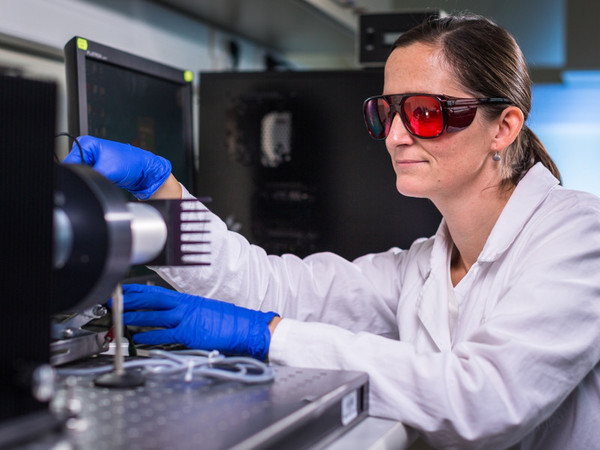A new project recently launched by the Regional Centre of Advanced Technologies and Materials (RCPTM) at Palacký University promises an important advancement in the development of technologies that will allow effective splitting of water molecules into hydrogen as a major sustainable source of energy. The development of hybrid nanomaterials using sunlight to split water is now in the hands of a new team led by a world-recognised scientist in the fields of material chemistry, photoelectrochemistry, and renewable energy, Patrik Schmuki. The contribution of almost 5 million euro by the Operational Programme “Research, Development, Education” will allow them to bring together scientists from several countries and acquire state-of-the-art equipment.
Environment-friendly hydrogen is considered the energy source of the future. In the next seven years, scientists involved in the project “Advanced Hybrid Nanostructures for Renewable Energy Applications” will develop new hybrid nanomaterials on the basis of metal oxides, using sunlight to split water into hydrogen and oxygen.
“Despite many advantages, such as low costs, non-toxicity, broad-scale availability, and chemical stability, these materials also have several deficiencies that prevent us from their high-capacity application in the production of green and cheap energy. The project aims to get rid of these deficiencies by combining metal oxides and nanocrystalline materials, which have been investigated in our centre for a long time. It involves new types of carbon quantum dots, two-dimensional graphene derivatives, or plasmonic nanoparticles of precious metals,” explained Radek Zbořil, RCPTM Director, according to whom the developed hybrid structures will enhance the efficiency of photocatalytic performance, and thus the volume of produced hydrogen. That should open up the new technologies to real, practical use.
Top-class world scientist to run the team
The existing research findings provided by RCPTM will be interconnected with the knowledge of Professor Schmuki, who is the key person in the outstanding team. Schmuki, a world-renowned scientist employed at the Friedrich-Alexander University in Erlangen-Nürnberg, Germany, has repeatedly placed in the global list of Highly Cited Researchers by Clarivate Analytics InCites™ (formerly Thomson Reuters). He is also the recipient of a prestigious grant by the European Research Council.
“I believe that the newly established laboratory with top experts and first-rate equipment will result in more intensified research in this vital area. The production of hydrogen from renewable resources, such as the sun and water, is not only a scientific, but a society-wide challenge, considering the continuous increase in the world’s population and their dependence on fossil fuels,” said Prof Schmuki. The roughly 15-member team will become a part of an international research network interconnecting elite groups in nanomaterial research from all over the world. The project will involve researchers, for instance, from Cornell University, USA; Aarhus University; Denmark; EPFL Lausanne, Switzerland; University of Nantes, France; and the Center for Superfunctional Materials of Ulsan National Institute of Science and Technology in South Korea.
Unique devices in tandem
One group in Olomouc will focus on material research, while another will focus on applications in photoelectrochemistry and renewable energy sources. They will have unique devices at hand in RCPTM, such as the high-resolution electron microscope with chemical mapping technology and Mössbauer spectroscopy. A novelty will be a device for laser photoelectrochemical spectroscopy scanning, which is a key method for the study of localised electrochemical properties of hybrid materials. “By connecting the current and new infrastructure in RCPTM, we have created one of the best-equipped laboratories for material and electrochemical research in all of Europe,” added Prof Zbořil.
